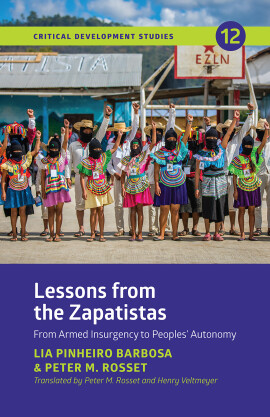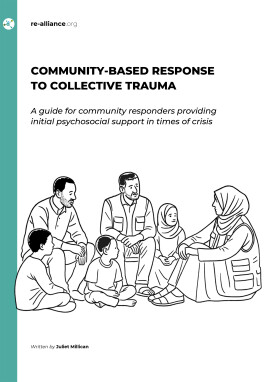
Hidden Politics in the UN Sustainable Development Goals
This book analyzes the politics of the UN Sustainable Development Goals (SDGs) and counters mainstream feelgood accounts of this agenda. Conventional wisdom says that efforts to achieve the SDGs contribute to building a more inclusive, sustainable and peaceful world. This book counters this orthodox and utopian view, uncovering the hidden politics of the project. Sneyd analyzes each of the seventeen goals and their targets and indicators. He argues that the SDG project does more to bolster the status quo than to address pressing global challenges.
Series: Critical Development Studies
Published: 2024
Pages: 192
eBook: 9781788534581
Paperback: 9781788534574
| Critical Development Studies Series | |||
|---|---|---|---|
| Series Editors | |||
| Foreword | |||
| Introduction | |||
| Goal 1: No Poverty | |||
| Goal 2: Zero Hunger | |||
| Goal 3: Good Health and Well-Being | |||
| Goal 4: Quality Education | |||
| Goal 5: Gender Equality | |||
| Goal 6: Clean Water and Sanitation | |||
| Goal 7: Affordable and Clean Energy | |||
| Goal 8: Decent Work and Economic Growth | |||
| Goal 9: Industry, Innovation, and Infrastructure | |||
| Goal 10: Reduced Inequalities | |||
| Goal 11: Sustainable Cities and Communities | |||
| Goal 12: Responsible Consumption and Production | |||
| Goal 13: Climate Action | |||
| Goal 14: Life below Water | |||
| Goal 15: Life on Land | |||
| Goal 16: Peace, Justice, and Strong Institutions | |||
| Goal 17: Partnerships for the Goals | |||
| Conclusions | |||
| Acknowledgements | |||
| Index |
'This book is a tremendous learning tool. Each of the seventeen SDGs is subjected to a sharp critical analysis that will spark debate and provide readers with the resources needed to begin their own research and reach their own conclusions. Highly recommended.'
Craig N. Murphy, professor emeritus, Wellesley College
'With striking originality, Adam Sneyd tears down the façade of the UN Sustainable Development Goals. Who, you might ask, does not want to end poverty and hunger? Who isn’t for peace, justice, and a healthy planet? Yet, as this spirited, inspiring book exposes, the Global Goals are doing more to legitimize a destructive and exploitative world order than truly advance global sustainability.'
Peter Dauvergne, professor of International Relations, University of British Columbia
'This is a must-read for anyone interested in understanding the limits of the UN Sustainable Development Goals. Deploying a critical political economy lens, Sneyd does a brilliant job in dispelling the myths around these powerful benchmarks in global development.'
Susanne Soederberg, professor and Canada Research Chair, Queen’s University
'Big business has long embraced the SDGs and Sneyd brilliantly lays out why that is. The SDGs do nothing to confront the structural enablers of corporate power, greed and impunity, or to put an end to tax dodging and union busting. This book puts a decisive end to the fiction that corporate-driven partnerships under the SDGs will end overconsumption and help us to realize the Brundtland Commission’s vision for truly sustainable development.'
Dr. Maria Hengeveld, Corporate Researcher, SOMO, Amsterdam
'This book is a concise, well-written, and impactful critique of the UN Sustainable Development Goals from the perspective of critical international political economy. I think a wide range of readers will enjoy it.'
Jesse Ovadia, associate professor, political science, University of Windsor
'From the very beginning, the Sustainable Development Goals were compromised. Far from reflecting the universal aspirations of the people of this planet, the non-binding character of the SDGs means that its targets were technocratic rather than being transformational. As a result, they did not confront the complex crises facing global civil society. Rather, they sought to maintain the power relations at a global, national and local level which were and are the fulcrum through which the SDGs were shaped, launched, and implemented, to a greater or lesser degree, by states since 2015. In a book that will be welcomed by academics, students, policy-makers and advocates alike, Adam Sneyd's Hidden Politics in the Sustainable Development Goals explains how and why this took place, and demonstrates why it is necessary to challenge the dominant social forces that shape how our planet is changing. An important and outstanding contribution.'
A. Haroon Akram-Lodhi, professor of economics, global justice and development, Trent University
'In Hidden Politics in the UN Sustainable Development Goals, Adam Sneyd unveils the political undercurrents shaping the ambitious agenda of the Sustainable Development Goals (SDGs). This pivotal work in Critical Development Studies exposes how the SDGs, while aimed at sustainable global development, are entangled in political strategies that reinforce the existing liberal international economic order, perpetuate global capitalism, and sustain the status quo. This book stands out for placing the politics of sustainable development at its core, challenging the reader to rethink the global order and the role of the SDGs within it. By linking the goals to broader political agendas and highlighting the emerging ideological conflicts, Sneyd contributes to a more nuanced understanding of global politics. This book is not just a critique but a call to action, urging for a fundamental rethinking of the goals to achieve genuine transformative change.'
Dr. Bonny Ibhawoh, professor of Global Human Rights, McMaster University and UN Independent Expert on the Right to Development
'The Sustainable Development Goals promised a new era of cooperation and prosperity. What happened? As the liberal order crumbles around us, Sneyd uncovers the hidden politics of UN goal-setting and shows how our institutions of global governance badly miscalculated the destabilizing effects of war, authoritarian populism and catastrophic climate collapse.
This book is a must-read.'
Marc Froese, professor of political science, Burman University
“This analysis is a powerful counterpunch to the feel good assumptions of the Sustainable Development Goals. Sneyd (and Schneider) stress test the goals in a way so that scholars and practitioners alike can see where further inequities and injustices will emerge, even if we succeed at achieving the Global Goals.'
Robert Huish, professor, Dalhousie University and host of the Global Development Primer podcast
'Politicians all too often make and break ambitious targets without consequence, but seeing this phenomenon unfold with the UN’s Sustainable Development Goals is especially concerning given humanity’s survival depends on the realization of many of these targets. Sneyd provides a much-needed explanation for what we are doing wrong, and where we can rectify. This book will enlighten anyone who feels like they are blindly striving to implement the SDGs but deep down knows that something is fundamentally off. Many of us cannot put our finger on what ‘it’ is, and Sneyd has succinctly and thoughtfully shed light on the matter in a way that I hope will lead to a serious shake-up of the UN’s Global Goal-setting process.'
Sopha Carodenuto, assistant professor, department of geography, University of Victoria
'With 2030 around the corner, governments are scrambling to show progress on the SDGs. Sneyd’s Hidden Politics in the UN Sustainable Development Goals offers a critical and timely analysis of the SDG project’s shortcomings and lessons for how to avoid such pitfalls in the future.'
Matias E. Margulis, University of British Columbia
'While well-intentioned, the Sustainable Development Goals (SDGs) are political artifacts which collectively play a role in legitimizing a particular vision of global capitalism. In Hidden Politics, Adam Sneyd does the work of disarticulating happy-sounding outcomes from the political economic contestation which underlies global development in practice. I've been waiting for years for someone to write this book - and Adam Sneyd has thankfully delivered! It will be an enormously helpful text for teaching students about globalization, the political economy of development, and of course the SDGs.”
Ryan Katz-Rosene, associate professor, University of Ottawa
Developmental Environmentalism in Guyana
Obeng‐Odoom, Franklin
Sustainable Development, Vol. 33 (2025), Iss. 4 P.5518
https://doi.org/10.1002/sd.3414 [Citations: 1]The New Palgrave Dictionary of Economics
Sustainable Development Goals (SDGs)
Dagher, Ruby
Sneyd, Adam
2025
https://doi.org/10.1057/978-1-349-95121-5_3213-1 [Citations: 0]




